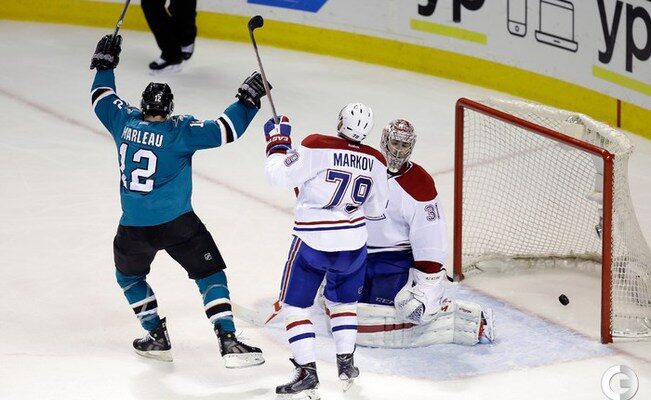
Carey Price, a legendary figure for the Montreal Canadiens, now sees his contract part of a strategic trade.
In the intricate world of professional hockey, where the salary cap often dictates strategy as much as on-ice performance, a recent trade has sent ripples through the National Hockey League. The Montreal Canadiens have officially moved the contract of their long-time franchise goaltender, Carey Price, to the San Jose Sharks. This transaction, while seemingly straightforward, is a masterclass in modern NHL general management – a testament to how teams leverage financial assets to forge their futures.
The Mechanics of the Deal: A Capologist`s Chess Match
The core of this deal sees the Montreal Canadiens sending Price’s contract and a fifth-round draft pick in 2026 to the San Jose Sharks. In return, Montreal acquires minor-league defenceman Gannon Laroque. For the Canadiens, the motivation is transparent: cap relief. Price, effectively retired from play due to a debilitating knee injury, was entering the final year of an eight-year, US$84-million deal. His $10.5-million cap hit, though only carrying $2 million in actual salary remaining after a recent signing bonus payout, represented a significant burden for a team looking to build its future. Post-trade, Montreal gains approximately $4.5 million in immediate cap flexibility, a precious commodity in the competitive NHL landscape.
On the flip side, the San Jose Sharks, currently in a robust rebuilding phase, willingly absorb Price`s “dead” contract. This is a common tactic for teams with ample cap space: weaponizing financial flexibility to acquire future assets. By taking on a contract that carries no on-ice expectation, the Sharks secure an additional draft pick – a small but valuable piece in their long-term strategy of restocking their organizational depth. It’s a classic win-win for two teams operating under vastly different timelines, where the art of salary cap manipulation truly becomes a sport within a sport.
Carey Price: A Legacy Beyond the Cap Sheet
While his contract`s transfer is a purely technical manoeuvre, it’s impossible to discuss Carey Price without acknowledging the indelible mark he left on the Canadiens franchise and the league as a whole. Price, a 38-year-old from Anahim Lake, B.C., hasn’t graced an NHL crease since April 2022. His career was tragically cut short by a persistent knee injury, an unfortunate end to what was a Hall of Fame-calibre run.
Known for his unparalleled calm demeanor under pressure and his highlight-reel “windmill” glove saves, Price was the backbone of the Canadiens for over a decade. Drafted fifth overall in 2005, he eventually surpassed Jacques Plante as Montreal`s all-time winningest netminder. His individual accolades speak volumes:
- Hart Memorial Trophy (NHL MVP): 2014-15 season
- Vezina Trophy (League`s Top Goalie): 2014-15 season
- Bill Masterton Memorial Trophy: 2021-22 season (for perseverance and dedication)
- Olympic Gold Medal: 2014 Sochi Olympics (as Canada`s starting goaltender)
Despite never hoisting the Stanley Cup, Price famously dragged an underdog Canadiens squad to the 2021 Final, showcasing his enduring brilliance even as his body began to betray him. His humble reaction to the trade, posting “Always a Hab. Just a teal one for now” on social media, perfectly encapsulates his understated class. While the Hockey Hall of Fame might have made him wait a year, the NHL`s capologists certainly didn`t, proving that even in retirement, a legacy can still carry significant weight – and cap space.
Gannon Laroque: The Future Asset
The other direct participant in this exchange, Gannon Laroque, is a 22-year-old defenceman from Edmonton. Drafted by the Sharks in the fourth round of 2021, Laroque has spent his developing years oscillating between the American Hockey League (AHL) and the ECHL. Notably, he did not feature in any games during the 2024-25 season – a detail that might pique the interest of talent scouts, but for the Canadiens, he primarily represents a prospect acquired in a deal driven overwhelmingly by financial considerations, a means to an end for the much-coveted cap relief.
Strategic Implications: What This Means for Both Teams
For the Montreal Canadiens, shedding Price`s contract is a pivotal step in their ongoing retooling. The newfound cap space offers crucial flexibility to potentially sign key restricted free agents, pursue unrestricted free agents in the future, or even absorb salary in further trades. It allows General Manager Kent Hughes greater latitude to shape his roster without the phantom burden of a superstar`s inactive contract, providing a clearer path for their youth movement.
For the San Jose Sharks, this is an intelligent, low-risk acquisition. Their objective is clear: accumulate draft picks and promising young players. Taking on Price’s expiring, largely paid-out contract for just one season is a minor inconvenience that yields a valuable future pick. It`s a pragmatic move that underscores their commitment to a long-term rebuild, transforming abstract cap space into tangible assets that can fuel their future aspirations.
A Final Chapter, A New Beginning
The trade of Carey Price’s contract serves as a fitting, if somewhat anticlimactic, final chapter to his storied tenure with the Montreal Canadiens. It’s a reminder that in professional sports, even the most legendary careers ultimately intersect with the cold, hard realities of team economics. For Montreal, it`s a step towards financial liberation; for San Jose, a calculated addition to their rebuilding arsenal. And for Price, it’s a symbolic transition, from the red, white, and blue of Montreal to the teal of San Jose – a testament to a career that will forever be remembered, even if his final NHL appearance wasn`t in uniform.









